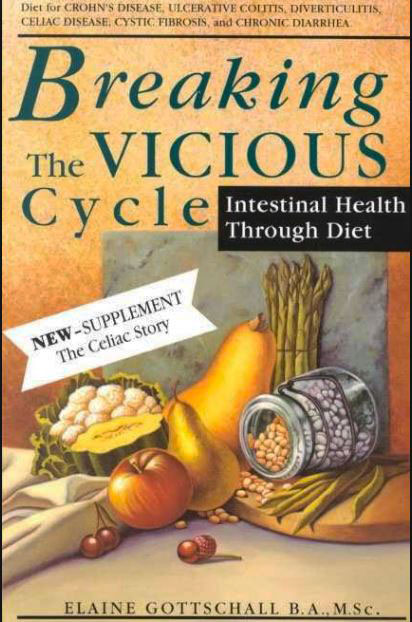I recently listened to an episode of the Full Plate podcast hosted by “anti-diet” nutritionist Abbie Atwood that centered on Crohn’s Disease and diet. Let me start off by saying, I like Abbie and have chatted with her a little bit on social media about “anti-diet” and what that means to me as someone who has modified diet to help keep my Crohn’s in remission for over 20 years. I do agree with Abbie on a lot of her points about body stigma, health at any size, and the overemphasis of weight loss or being “thin” as a signifier of “being healthy.” We part ways on whether there is room for intentional food group elimination that is not for allergy, Celiac disease, or something that absolutely requires it – like you would die if you ate it. Abbie is centered more on disordered eating and that is not something we don’t talk about enough in the Specific Carbohydrate Diet™ world, though there is a high prevalence of disordered eating among people with IBD. I dove a little into the subject on my own podcast here.
In this particular episode of the podcast, the guest on the show was someone with Crohn’s Disease. I was a little nervous to listen to the episode as someone with Crohn’s Disease who very much believes that diet modification has helped me live a fuller life than the one I was having before I started it – work full time, travel internationally, hike, go on long road trips, etc. While the guest, Lacey, was unsuccessful in her dietary attempts, neither said diet has absolutely no effect on how someone with Crohn’s feels or reacts to food, though they were more in the eat what you want realm. What I realized as I was listening, is that the “diet culture” approach to the attempts at a food restriction was entirely short-sighted and had nothing to do with Lacey as an individual person. I was glad I did listen, because it got me thinking about my own two-decades long IBD and food journey and the current anti-diet movement.
What is “anti-diet”?
At the core the anti-diet movement started in response to the pervasive messaging about weight and weight-loss throughout our daily lives. The thought is that movies, TV, commercials, talk shows and magazines create a fat-phobic society that cherish smaller bodies above all else. It also pushes back at the weight loss industry for profiting off of people who are desperate to fit into these societal expectations. I don’t disagree with those sentiments at all. There is also pushback on the “wellness industry.” The wellness industry makes claims about diets such as Gluten-Free, Paleo or Mediterranean as being cure-alls for a multitude of conditions, particularly autoimmune conditions. I also don’t disagree with pushback against these blanket claims. Wellness culture also has a tendency toward classism and can be culturally exclusionary.
Anti-diet nutritionists emphasize the need to not moralize food and that is also something I agree with. I cringe a little bit every time I see someone say that everyone should eat SCD and that it’s the “healthiest diet there is.” I think it’s important to concentrate on ourselves and what works for us and not judge the choices others make. SCD is not an appropriate diet for everyone for a variety of reasons. We should not be judging people on the food choices they make (that goes for the anti-diet folks as well – they get a little judgmental about my choices too). What I don’t agree with is that there are no good or bad foods. There are foods out there that are simply do not provide nutritional value. Simply providing calories is not nutrition. Does that mean they should never be eaten? Maybe, maybe not. There are additives banned outside of the U.S. that are allowed in foods in the U.S. that may cause harm. Should those be consumed by people who don’t have enough information to determine what may be unhealthy for them? Personally, I don’t think so.
Is the Specific Carbohydrate Diet a Part of Wellness Culture?

What struck me as I listened to the podcast is that both Abbie and her guest are young, under 30 or around that. They have always lived with “wellness culture.” It doesn’t surprise me that they would think of any dietary protocol as are a part of what has now become a money-making industry. While weight-loss culture certainly existed my entire life, diet as a healing component to illness management did not. I started SCD Diet in 2000 and I have never had any kind of medical support for using SCD to help manage my symptoms. I never had any outside influence encouraging me to take this route and I have mostly experienced discouragement from those around me.
In the podcast, Lacey indicated that she had a short phone consult with a nutritionist who said she should have been “gluten-free.” That was horrible advice. We know people with Celiac disease have to avoid gluten or they will become seriously ill. They must avoid cross-contamination and their diet requires vigilance to not accidentally ingest food that will cause them harm. That doesn’t have anything to do with using nutritional therapy for IBD. Telling someone with IBD to “go gluten-free” tells them nothing. There are tons of gluten-free products on the market that would likely cause more gut irritation than just eating the regular product.
SCD was created as a therapy to reduce, and hopefully eliminate, the inflammation in the digestive tract, however it has not yet been embraced by the entire medical community. What it is designed to do is feed the body with food that will balance the microbiome. The truth is it does not work for everyone. However, it does work for some. Unfortunately there isn’t enough data at this point to show definitive numbers on how many have been help or reached remission through Specific Carbohydrate Diet. What we have is testimonials from thousands of people who have had at least some success with it. I am one of them.
What I do know is that SCD is starting to gain support in the medical community and there are some promising studies out there, particularly in the world of pediatric gastroenterology. There are also many studies on the relationship between diet and IBD and many recent studies indicate a relationship between certain types of food, particularly sugar and highly processed foods, and IBD flareups. My hope is that medical nutritional therapy (MNT) becomes a part of IBD treatment where appropriate.
To answer my original question. I don’t think SCD is a part of the commoditized wellness culture in the same way the Paleo diet has. SCD is not a catch-all for every disorder, not is a cure-all that will work for everyone. It is an outline based on research of the digestive system and the way a compromised digestive system reacts to the different components that make up food.
Eat for Your Own Wellness
I will get more into disordered eating and IBD in a separate post, but I want to conclude this article by saying we need to choose the food that helps our bodies. Part of the anti-diet movement is to not shame people for food choices. That should include choosing SCD diet if that works for you. You are not feeding a corporate machine because you are using a guide – Breaking the Vicious Cycle and SCD Diet- to help you choose your food.
You can see more my personal story in my talk at the SCDROCKS Conference:
- SCD “Oreo-Style” Vanilla Sandwich Cookies - November 17, 2025
- Grain-Free Red Lentil Bread: Ancient Nutrition Meets Modern Gut Health - November 5, 2025
- SCD Pistachio-Date Thumbprint Cookies Inspired by Ancient Mersu - October 26, 2025



Follow Happy Gut For Life